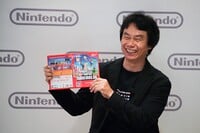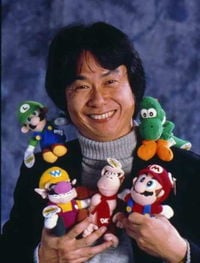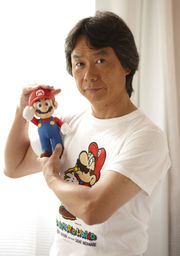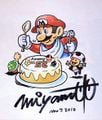Shigeru Miyamoto: Difference between revisions
(→Quotes) |
(→Quotes: That was a pleonasm, how come nobody noticed this until now?) |
||
| Line 49: | Line 49: | ||
*"''Who knows how Mario will look like in the future. Maybe he'll wear [[Metal Mario (form)|metallic clothes]]!''" - 1991<ref>Interview in ''Mario Mania'' guide, p. 31</ref> | *"''Who knows how Mario will look like in the future. Maybe he'll wear [[Metal Mario (form)|metallic clothes]]!''" - 1991<ref>Interview in ''Mario Mania'' guide, p. 31</ref> | ||
*"''Videogames are bad for you? That's what they said about rock 'n' roll.''"<ref>Shelf, David (1993). ''Game Over: How Nintendo Conquered The World''. Random House.</ref> | *"''Videogames are bad for you? That's what they said about rock 'n' roll.''"<ref>Shelf, David (1993). ''Game Over: How Nintendo Conquered The World''. Random House.</ref> | ||
*"''A delayed game is eventually good, a | *"''A delayed game is eventually good, a rushed game is forever bad.''"<ref>[http://www.theguardian.com/technology/gamesblog/2012/apr/27/shigeru-miyamoto-rushed-game-forever-bad Shigeru Miyamoto: A rushed game is forever bad] (April 27, 2012). ''The Guardian''. Retrieved September 2, 2014.</ref> | ||
*"''My favorite video game character is not Mario, it's [[Pac-Man]].''"<ref>David Doñas Salinas ''Metroide'', Por. (2002) [http://usuarios.lycos.es/polbook1/Art%EDculos/Biografias/Miyamoto/B%20miyamoto.htm Biografía Shigeru Miyamoto (Spanish)], [http://translate.google.com/translate?u=http%3A%2F%2Fusuarios.lycos.es%2Fpolbook1%2FArt%25EDculos%2FBiografias%2FMiyamoto%2FB%2520miyamoto.htm&sl=es&tl=en&hl=en&ie=UTF-8 translated]. Retrieved August 22, 2008.</ref> | *"''My favorite video game character is not Mario, it's [[Pac-Man]].''"<ref>David Doñas Salinas ''Metroide'', Por. (2002) [http://usuarios.lycos.es/polbook1/Art%EDculos/Biografias/Miyamoto/B%20miyamoto.htm Biografía Shigeru Miyamoto (Spanish)], [http://translate.google.com/translate?u=http%3A%2F%2Fusuarios.lycos.es%2Fpolbook1%2FArt%25EDculos%2FBiografias%2FMiyamoto%2FB%2520miyamoto.htm&sl=es&tl=en&hl=en&ie=UTF-8 translated]. Retrieved August 22, 2008.</ref> | ||
*"''A great idea can solve multiple problems at the same time.''"<ref>http://www.nintendo.com/nintendo_direct</ref> | *"''A great idea can solve multiple problems at the same time.''"<ref>http://www.nintendo.com/nintendo_direct</ref> | ||
Revision as of 00:03, May 5, 2015
- “What if, on a crowded street, you look up and see something appear that should not, given what we know, be there. You either shake your head and dismiss it, or you accept that there is much more to the world than we think. Perhaps it really is a doorway to another place. If you choose to go inside you may find many unexpected things ...”
- —Shigeru Miyamoto
Shigeru Miyamoto (in Japanese: 宮本 茂) is a video game developer best known for being the creator of the Mario, Donkey Kong, The Legend of Zelda, Star Fox, and Pikmin series, among others. He rides his bike, or walks to work each day, usually with his wife, whom he met on the job (she was a general manager for his current occupation). He joined the industry as a designer for character art in 1977. He has worked on many famous Mario games and the well-known original version of Super Mario Bros. 2, Yume Kōjō: Doki Doki Panic.
In his early childhood, he was raised in the small, rural town of Sonobe, Japan, which is near his current home of Kyoto, about ten blocks from Nintendo headquarters. His home lacked a television, so he would spend a large amount of his time exploring the surrounding countryside. One time, he discovered a large series of caves. He returned with a lantern and spent the summer spelunking.
Miyamoto wanted to make things that would astonish the world. In elementary school, he considered becoming a puppeteer, a painter, and later found interest in making toys. He also learned how to play the guitar and banjo. Miyamoto decided to study industrial design at Kanazawa Munici College of Industrial Arts and Crafts in 1970. Miyamoto only attended his classes half the time, and it took him five years to graduate.
Miyamoto was 24, and had shaggy hair when he had his father contact an old toy company friend, named Hiroshi Yamauchi. The company's name was Nintendo. Yamauchi requested to see some toy designs, to which Miyamoto responded by returning with a bag of goodies, and an amazing portfolio. Miyamoto became Nintendo's first staff artist in 1977.
Three years later, in 1980, Nintendo of America was looking for a hit to establish themselves in the arcade market. They ordered a large number of units of an arcade game called Radar Scope, but by the time the machines arrived, the interest in the game had bombed. Nintendo needed a game that the machines could be converted into easily. Yamauchi called Miyamoto into his office, as he was the only staff member available at the time. He questioned Miyamoto about his knowledge on this new concept. Miyamoto claimed to have loved video games in college. After some licenses fell through, Donkey Kong was born and made a huge hit.
With Donkey Kong's success, Miyamoto was given his own team: R&D 4, later known as Nintendo EAD. They would go on to make some of Nintendo's most memorable games, including Mario. While Miyamoto has mentioned that he finds it difficult to say who his favourite Nintendo character is, he states that some of his more beloved favourites include Mario, Princess Peach, Luigi, Bowser, Princess Zelda, Toad, Link, and Donkey Kong.[1] His favorite Mario game is Super Mario Bros 2 for the NES[2][3]. His favorite games for the NES are Baseball, Golf and Mario Bros..[4] Miyamoto's favorite non-Nintendo game is Angry Birds. [5]
Miyamoto starred in a Mega 64 sketch about New Super Mario Bros. [6] Despite being an influential figure in video games and responsible for multi-million dollar franchises, Miyamoto is said to be very humble, insisting on settling for an average income. Miyamoto is also ambidextrous. He favors his left hand and likes to make characters that are left-handed (Bowser Jr. and Link being two examples). He has also been referred to by Mario in the game Mario vs. Donkey Kong.
In early December of 2011, it was rumored that Miyamoto has announced his retirement. A few days later, the rumor was confirmed a fake.[7]
To honor the Year of Luigi, Miyamoto is often seen wearing Luigi-styled clothing for press appearances.
Awards and honors

- The first ever Inductee to the Academy of Interactive Arts and Sciences Hall of Fame
- A star on the Walk of Game
- French Order of Arts and Literature
- Featured in Time Asia's "60 Years of Asian Heroes"
- GDC's Lifetime Achievement Award
- Subject of an episode of Icons
- The Spanish prize Príncipe de Asturias in Communication and Humanities.[8]
- The 'Fellowship' award in the British Academy Video Game Awards.[9]
Hand-drawn artwork
- NSBW New Year.jpg
Quotes
- "Who knows how Mario will look like in the future. Maybe he'll wear metallic clothes!" - 1991[10]
- "Videogames are bad for you? That's what they said about rock 'n' roll."[11]
- "A delayed game is eventually good, a rushed game is forever bad."[12]
- "My favorite video game character is not Mario, it's Pac-Man."[13]
- "A great idea can solve multiple problems at the same time."[14]
- "I’ll put my neck out and say that PlayStation games sound good, but when you watch them in action they’re not finished at all in my opinion. A game is finished when a creator decides it is."[15]
Trivia
- In the intro cutscene to the Pelagic II mission from the game Perfect Dark, a guard with Miyamoto's face can be seen. Additionally, all guards in this level wear overalls that resembles those of Fire Mario.
References
- ^ Nintendo mastermind Shigeru Miyamoto isn't ready for 'game over' [1]
- ^ Q&A: "Mario" creator Shigeru Miyamoto.
- ^ This Is Shigeru Miyamoto's Favorite Mario Game (June 15, 2012). IGN. Retrived September 1, 2014.
- ^ http://www.reinodocogumelo.com/2013/03/mario-bros-e-um-dos-games-favoritos-de.html
- ^ Shigeru Miyamoto admits he's a fan of Angry Birds
- ^ Mega64: New Super Mario Bros. Video
- ^ Nintendo: Miyamoto Not Stepping Down
- ^ [2]
- ^ [3]
- ^ Interview in Mario Mania guide, p. 31
- ^ Shelf, David (1993). Game Over: How Nintendo Conquered The World. Random House.
- ^ Shigeru Miyamoto: A rushed game is forever bad (April 27, 2012). The Guardian. Retrieved September 2, 2014.
- ^ David Doñas Salinas Metroide, Por. (2002) Biografía Shigeru Miyamoto (Spanish), translated. Retrieved August 22, 2008.
- ^ http://www.nintendo.com/nintendo_direct
- ^ Miyamoto Says PlayStation Games Felt Incomplete (March 15, 2014). Gamnesia. Retrived September 2, 2014.




